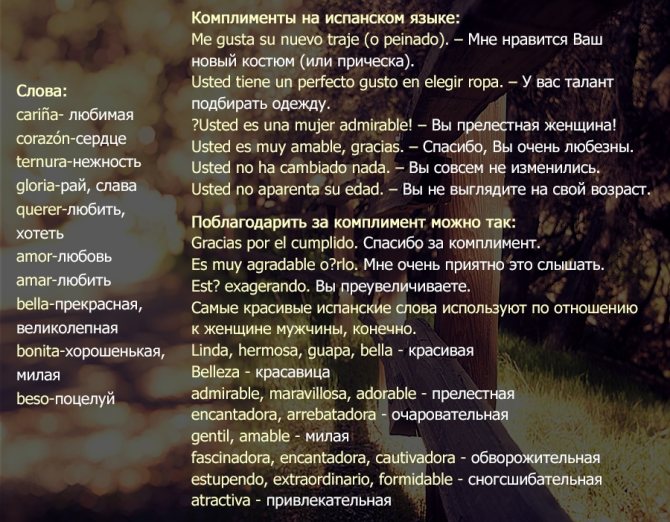The language of love is universal, but love words and phrases sound different in the languages of the world. In order to talk about your feelings and be understood at the same time, it is important to know the right words and phrases.
If you want to tell someone "I love you" in Spanish or are looking for other ways to express your feelings in this wonderful language, you've come to the right place. In this article, we've collected the basic love vocabulary in Spanish that will help you communicate fluently and understand the subject.
Let's start with the basics: How do I declare my love? In Spanish, there are two verbs with the meaning of "to love":
- amar - to love: when referring to a passionate, ardent feeling, often reserved for lovers in special occasions (although it can sometimes be used in a different context, such as a mother telling a child that she loves him).
- querer - love: a more common verb, a common word, it can be said equally to relatives, friends and soulmates.
Of course, these are not all the words you can use to express your feelings for someone. For example if you like someone, use the verb gustarand if you are in love - enamorarse.
That is how the verbs can be used:
Te quiero (mucho). - I love you (much).
Te amo (mucho) .. - I love (much) you [more serious feelings].
Yo también te amo/quiero. - I love you too.
Estoy enamorado/a. - I am in love.
Estoy enamorado(a) de ti. - I am in love with you.
Me gustas (mucho). - I (really) like you.
(También) me gustas. - I (also) like you.
Te adoro. - I adore you.
Te necesito. - I need/need you.
Gentle Spanish words for the other half
mi amor my love, my love, etc. (you can say simply amor)
querido(a) dear, dear, beloved, dear
cariño dear, sweetheart
corazón . Or, in the heart: darling, my darling, my bunny, etc.
mi vida my life
mi tesoro my treasure
mi cielo (lit. mi cielo) literal translation does not sound very good, but in Spanish it is a common expression - you can translate it as "dear(er)", "dear(er)", etc.
mi rey / mi reina mi rey / mi reina is a nickname for someone who likes to feel special.
nene (nena) baby, toddler, baby
gordito(a) Literally translates as "fatty/fatty," but can be used as a gentle nickname for the other half.
hermosa Belle (there is also a male variant, hermoso, but this is rarely used).
mueca doll
Examples:
Yo también te quiero, nena. I love you too, baby.
¿Quieres hacer algo de desayunar, corazón? Will you make me breakfast, sweetheart?
Feliz cumpleaños, querido.. Happy birthday, honey.
Soy Gollum... y tú eres mi tesoro. I am Gollum and you are my precious.
Cualquier cosa por ti, nene. Anything for you, baby.
Secrets of attraction
Anyone who hears live Spanish at least once is left very impressed and, as a result, asks the question: why is it so appealing? The answer lies in the lexical plane, because it is not without reason that this particular foreign language takes an honorable 5th place among all languages of the world in terms of its richness and aesthetics. What is the secret? There are several:
- active use of diminutive suffixes; - large number of expressive expressions; - many bright funny words; - wide range of vocabulary to express positive and overly emotional evaluations.
Surely it is these features and the beautiful Spanish words themselves that encourage people all over the world to learn this language. And here it is not unreasonable to note that many famous polyglots knew it, including Anthony Burgess, about whom we write here.
Topic Phrases
Eres mi todo. - You are everything to me.
Eres el amor de mi vida. - You are the love of (my) life.
Te quiero con todo mi alma .. - I love you with all my soul.
Te quiero con locura .. I love you madly.
Estoy completamente enamorado(a) de ti. - I am head over heels in love with you.
Cada diํa te quiero más. - Every day I love you more and more.
Dar mi un beso. - Kiss me.
¿Me quieres/amas? - Do you love me?
Te echo de menos. - I miss you.
Te voy a echar de menos. - I will miss you.
Soy feliz de compartir cada instante de mi vida a tu lado. - I am happy that I can share every moment of my life with you.
Tu amor me inspira, tu ternura me conmueve y tus besos me enloquecen .. - Your love inspires me, your tenderness moves me, and your kisses drive me crazy.
Pienso en ti todo el tiempo. - I think of you all the time.
Solo puedo pensar en ti. - I can only think about you.
Soy muy afortunado de conocerte. - I am very lucky to have met you.
Me haces (mucha) falta. - I (mucha) miss you.
Me vuelves loco(a) .. - You make me crazy.
Estoy loco(a) por ti. - I am crazy about you.
No puedo vivir sin ti.. - I can't live without you.
Te querré/amaré siempre. - I will love you always.
Nunca voy a parar de querer/amar te. I will never stop loving you.
Eres espectacular. - You're terrific.
Eres la persona mas maravillosa del mundo. - You are the most wonderful person in the world.
Una sonrisa tuya me hace inmensamente feliz. - Your smile makes me immensely happy.
No puedo esperar a verte.. - I can't wait to see you.

Status of the happiest
The peculiarity of Spanish is confirmed not only by its speakers and listeners, but also by scientists. Thus, a group of American researchers in the course of their experiments have found that this is a foreign language can safely be considered the happiest, or rather - the most positive-sounding. During the study, scientists compared ten languages, among which were seemingly no less charming French, Portuguese and even English. The participants of the study had to estimate which language vocabulary evokes the most positive emotions in them. As a result, the absolute leader was determined - Spanish. By the way, you can learn more about the peculiarities of its study from the article "Spanish for Beginners from Zero".


Thus, here are the most beautiful Spanish words by topic with translation. This is a ready-made toolkit for using the foreign language in all its glory. So, read, learn and amaze everyone with the beauty of your speech. And for those who are just starting to conquer this foreign language, we recommend reading our article "Learning Spanish by yourself from scratch online" - you can get useful information from it on how to make your learning as effective as possible.
Love and relationships in Spanish: a glossary
afecto - affection, feeling cariño - affection, affection, love amor verdadero - true love amor prohibido - forbidden love amor platónico - platonic love sentir cariño/amor por alguien - feel affection/love for someone acariciar - caress, caress caricia - touch; caress; tenderness cogerse la mano - hold hands abrazar - embrace abrazo - hug besar - kiss beso - kiss pasión - passion apasionado(a) - passionate
relación (amorosa) - romance la cita - date Estamos saliendo. - We are going out. mi novio - my boyfriend my girlfriend - my girlfriend Tienes novia(o)? - Do you have a girlfriend/boyfriend? Estamos comprometidos. - We are engaged. mi prometido - my fiancé mi prometida - my fiancée la boda - wedding el matrimonio - marriage Estamos casados. - We are married. mi esposo/marido - my husband mi esposa - my wife mi cónyuge - my spouse (form) mi amante - my lover/my lover (can also mean "mistress") mi pareja (pareja means "couple") - my partner mi compañero(a) - Used as a way of referring to each other in couples who have been together for a long time and may even be living together.
Learning to say hello and goodbye in Spanish


The simplest universal greeting ¡Hola!
There are also phrases that indicate the time of day, such as ¡Buenos días! - Good morning! Good afternoon! (can be heard from 6:00 to 12:00 noon), ¡Buenas tardes! - Buenas tardes! (from 12:00 to 8:00 p.m.) and ¡Buenas noches! - Good evening! (from about 8 p.m.) with the same phrase Spaniards wish "Good night!". The response to these greetings can be a repetition of these phrases, or just a part of them: ¡Buenas tardes! - ¡Buenas!
| ¡Adiós! | Bye! |
| ¡Hasta luego! | See you soon! |
| ¡Hasta el próximo lunes! | See you Monday! |
| ¡Hasta mañana! | See you tomorrow! |
| Nos vemos, mañana. | See you, tomorrow! |
Unlike Russian and some other Slavic languages, where the day is conventionally divided into three intervals, in many languages of the Romance and Germanic group the day is conventionally divided into two parts - morning and afternoon.
How to thank


| Gracias. | Thank you. |
| Gracias por todo. | Thank you for everything. |
| Gracias por tu / su ayuda. | Thank you for your / your help. |
| No hay de qué. | You are welcome. / No hay de qué. (as a response to thank you). |
| No hay nada que agradecer! | No hay nada que agradecer! |
Words of greeting
Here are some basic expressions in Spanish to start with. You can greet your interlocutor with these words and ask how they are doing.
| Word in Spanish | Translation into Russian |
| ¡Buenos días | Good morning |
| Buenas tardes | Buenas tardes |
| Buenas noches | Buenas noches |
| Hola | Hi |
Personal pronouns
| Person | Singular | Plural |
| 1 | yo я | nosotros, nosotras we |
| 2 | tú you | vosotros, vosotras you |
| 3 | él he | ellos they are |
| ella she | ellas they are | |
| usted You (polite form) | ustedes You |
- Yo soy profesor. - I am a teacher.
- Nosotros estamos en el parque. - We are in the park.
- Tú eres muy lista. - You are very intelligent.
Since the verb form accurately indicates a person, pronouns are often omitted:
- Soy profesor.
- Estamos en el parque.
- Eres muy lista.
But they are obligatory in opposition:
- Tú eres profesor y él es médico. - You are a teacher and he is a doctor.
- Yo leo la prensa del día y ella prefiere escuchar las noticias por la tele. - I read the newspaper every day and she prefers to listen to the news on TV.
The forms of polite address are not omitted. usted, ustedes.:
- ¿No está usted ocupado? - Aren't you busy?
- Ustedes son muy amables. - You are very kind.
Forms of polite address are abbreviated in writing: Ud., Uds., or Vd., Vds. (because historically they go back to the expression Vuestra merced. Your Grace). Both spellings are possible:
- ¿Cómo está Ud.? - How do you do?
- ¿Trabajan Vds. aquí? - Do you work here?
Form vosotros is not used in Latin America. It is replaced by the form ustedes, even when referring to a group of friends:
- ¿Han pasado ustedes el examen hoy? - Did you pass your exam today?
- ¿Son ustedes de México? - Are you from Mexico?
Personal pronouns have accusative and dative cases.
| Accusative case | Dative case | Accusative case |
| yo | me me | me me |
| tú | te you | te you |
| él | le him | le/lo him |
| ella | le her | la her |
| usted | le To you | le/lo, la you |
| nosotros/as | nos us | nos us |
| vosotros/as | os you | os you |
| ellos | les them | les/los their |
| ellas | les them | las their |
| ustedes | les them | les/los, las you |
The dative forms are also called indirect complements. complemento indirectoand accusative cases are called direct complements. complemento directo. In contrast to the stressed forms of pronouns, both of these forms are called unstressed.
The direct complement (accusative case) always comes before the conjugated verb.
The forms le / les refers only to masculine singular and plural persons:
- Ayer vi a Pedro y hoy no le he visto. - Yesterday I saw Pedro, but today I haven't seen him.
- ¿Has visto a mis amigos? - No, no les he visto. - Have you seen my friends? - No, I have not seen them.
Forms lo / los refer to both persons and objects in the masculine singular and plural:
- ¿Has visitedado a Antonio? - Sí, lo he visitado. - Did you visit Antonio? - Yes, I visited him.
- El libro que me traes ya lo he leído. - The book you brought me, I had already read it.
- ¿Esperas a Pedro y Juan? - Sí, los espero. - Are you waiting for Pedro and Juan? - Yes, I am waiting for them.
- ¿Dónde están mis libros? - Los has dejado en la mesa. - Where are my books? - You left them on the table.
Forms la / las refer to persons and objects in the feminine singular and plural:
- ¿Ves a María? - Sí, la veo. - Do you see Maria? - Yes, I see her.
- ¿Recuerdas esta canción? - Sí, la recuerdo. - No, no la recuerdo. - Do you remember this song? - Yes, I remember it. - No, I do not remember it.
- Mis amigas son muy buenas y las quiero mucho. - My friends are very good and I like them very much.
- Me gustan estas flores y las cuido. - I love these flowers and take care of them.
Form lo can refer to whole phrases, ideas, judgments:
- Voy a llegar temprano hoy. - Lo dudo. - I'm coming early today. - I doubt it.
The other forms of accusative pronouns refer to people:
- Te escucho con atención. - I listen to you carefully.
- Os espero en mi casa. - I am waiting for you at home.
- Vamos a la fiesta, nos invita Carlos. - Let's go to the fiesta, Carlos invites us.
- ¿Me ha llamado alguien? - No, no te ha llamado nadie. - Did anyone call me? - No, no one called you.
If the direct object (person or object) is at the beginning of the sentence, it must be repeated as a direct object-pronoun:
- A mi mejor amiga la conocí en el primer grado de la escuela. - I met my best friend in first grade at school.
- Su última novela el autor la dedicó a su madre. - The author dedicated his last novel to his mother.
The indirect complement (dative case) always comes before the verb as well:
- El profesor nos explica la regla nueva. - The teacher is explaining a new rule.
- Le regalo una muñeca. - I give her a doll.
- Les compro a los niños unos bombones. - I buy them candy.
The indirect complement, which is expressed by a noun with a preposition and comes before a verb, is necessarily repeated as an indirect pronoun:
- A mis amigas les perdono muchas cosas. - I forgive my friends a lot.
- A María le preparo una sorpresa. - I am preparing a surprise for Maria.
If the indirect complement comes after the verb, the use of the pronoun is arbitrary:
- (Le) regalo a mi nieta una muñeca. - I am giving my granddaughter a doll.
- (Les) compro a los niños unos bombones. - I buy candy for the children.
In sentences with compound tenses (see Compound Past Tense, Simple Future Tense), complements of both kinds come before the auxiliary verb:
- ¿Dónde están mis gafas? - Las he visto cerca del televisor, abuelita. - Where are my glasses? - I saw them near the TV, grandmother.
- José me ha relatado una historia interesante. - Jose told me an interesting story.
- Te he llamado muchas veces hoy. - I called you many times today.
With periphrases like verb + preposition + infinitive or verb + gerund (cf. "The pronoun adjective can come both before the conjugated verb and after the infinitive (gerund), and then it is connected to it:
- ¿Me puedes explicar esta regla? — ¿Puedes explicarme esta regla? - Can you explain this rule to me?
- Te estoy escuchando. — Estoy escuchándote. - I'm listening to you.
With simple gerunds and with the affirmative imperative, pronouns in the accusative and dative cases can only come after them and must be written together, if necessary, the accent must be put on the letter (see "Gerund. Formation and meaning", "Affirmative imperative"):
- - Tú siempre estudias al son de la música, ¿no te molesta? - You always study to the sound of music. Does it not disturb you? - No, hombre, escuchándola me pongo más tranquilo. - No, my friend, when I listen to it, I become calmer.
- ¡Dímelo, por favor! - Tell me that, please!
- ¡Quítese el abrigo, por favor! - Take off your coat, please!
If you want to use both complements, put the indirect complement in the dative case first, and then the direct complement in the accusative case:
- ¿Me traes el periódico? - Sí, te lo traigo. - Will you bring me the newspaper? - Yes, I'll bring it to you.
- ¿Nos compráis esas revistas? - Sí, os las comparamos. - Will you buy us these magazines? - Yes, we will buy them for you.
- Mañana Juan nos devolverá el libro. Mañana nos lo devolverá. - Tomorrow Juan will return the book to us. Tomorrow he will give it back to us.
If the two complements are used with a periphrasis verb + preposition + infinitive and come after the infinitive, then the infinitive is sure to be marked in the script by the stress:
- ¿Va a comprarte un regalo tu marido? - Sí, mi marido va a comprármelo. - Will your husband buy you a present? - Yes, my husband will buy me one.
- ¿Vas a enseñarnos tu apartamento nuevo? - Sí, voy a enseñároslo. - Will you show us your new apartment? - Yes, I will show it to you.
- ¿Puedes prestarme tu pluma? - Sí, puedo prestártela. - Can you lend me your pen? - Yes, I can lend it to you.
If both 3rd person singular or plural pronouns are used, the complements are in the dative case le, les take the form .:
- ¿Lee la abuela un cuento a su nieto? - Sí, la abuela se lo lee. - Does grandmother read a story to her grandson? - Yes, grandmother reads it to him.
- ¿Quién quiere hacerle una pregunta al profesor? - Yo quiero hacérsela. - Who wants to ask the professor a question? - I want to ask him one.
- ¿Le regala María a su hermana unos discos nuevos? - Sí, María se los regala. - Is Maria going to give her sister new CDs? - Yes, Maria will give them to her.
Striking forms of pronouns
| Personal pronoun | Pronoun |
| yo | a/para/de/sin mí me/for me/about me/ without me |
| tú | a/para/de/sin ti you/for you/about you, without you |
| él, ella, usted | a/para/de/sin él/ella/usted for him/for him/about him, to her/for her/about her, to you/for you/about you |
| nosotros/as | a/para/de/sin nosotros us/for/about/by us |
| vosotros/as | a/para/de/sin vosotros to/from/about/without you |
| ellos, ellas, ustedes | a/para/de/sin ellos/ellas/ustedes to them, for them; to you, for you/about them/without them/without you |
The stressed forms of personal pronouns are only used with prepositions:
- Lo hizo por mí. - He did it for me.
- Lo hizo para mí. - He did it for me.
- No iremos al cine sin él. - We will not go to the cinema without him.
It is possible to use stressed and unstressed forms of pronouns in the same sentence:
- Te lo explico a ti. - I am explaining it to you.
- Me lo pide a mí. - He asks me to do this.
If the stressed form is at the beginning of the sentence, it must necessarily be repeated by the unstressed form of the pronoun:
- A mí me gusta la paella. - I love paella.
- A ti no te molesta el ruido. - You don't mind the noise.
- A ella no la veo. - I can't see her.
The accented form is necessary to clarify the face:
- A él le relataré todo, y a ella no le diré nada. - I will tell him everything, but I will not tell her anything.
- Se lo regalo a él. - I give this to him.
With preposition con The pronouns mí, ti form special forms - conmigo, contigo:
- Quiero hablar contigo. - I want to talk to you.
- Mis amigos van conmigo. - My friends will go with me.
Accented pronoun sí translates to oneself, to oneself:
- María volvió en sí. - María volvió en sí.
- Pedro dice que escribe esta novela para sí mismo. - Pedro says he is writing this novel for himself.
With the preposition con takes the form consigo:
- Pedro no quiere llevarme consigo. - Pedro does not want to take me with him.
Read more
| ← Degrees of comparison of adjectives | Adjective pronouns → |
Restaurant and café


| ¿Qué me recomienda? | What do you recommend? |
| ¿Me recomienda algún plato tradicional? | Can you recommend me a traditional dish? |
| Quería probar algo típico de esta ciudad / región. | I would like to try something typical of this city/region. |
| ¿Tiene un menú vegetariano? | Do you have a vegetarian menu? |
| ¿Cuál es el plato del día? | What is the dish of the day? |
| ¿Qué lleva? | What is it made of? |
| ¿Tiene ajo? | Is there garlic in it? |
| Quisiera algo de / sin.... | I would like something from / no.... |
| ¿Con qué viene? | What does it go with? (With what garnish) |
| ¿Qué guarnición lleva? | What side dish? |
| Para mí el salmón con la ensalada mixta | I would like the salmon with the mixed salad. |
| El gazpacho | gazpacho |
| La tortilla de patatas | tortilla |
| El pescado al vapor con espárragos | Steamed fish with asparagus |
| Las gambas / pollo a la plancha | grilled fish / shrimp / chicken |
| Una ración de mejillones / caballa / patatas fritas | One order of mussels / sea bass / French fries |
| Me gustaría | I'd like that... |
| De primero | for the first |
| De segundo | for the second |
| De postre | for dessert |
| la magdalena | cupcake |
| la ensaimada | puff pastry sprinkled with powdered sugar |
| los churros | churros |
| el helado | ice cream |
| Para beber | of drinks |
| una taza de café solo / con leche | a cup of black coffee / with milk |
| un vaso de zumo de naranja / manzana | a glass of orange / apple juice |
| una botella de agua mineral con gas / sin gas | bottle of mineral water with gas / without gas |
| Disculpa... / Perdona... | Sorry (sorry) |
| Por favor, me traiga... | Can you bring me, please.... |
| otra copa de vino | another glass of wine. |
| tinto, seco, blanco | red, dry, white. |
| Dejar una propina | tip |
| La cuenta, por favor. | The bill, please. |
In the city.


| ¿Hay algún mercadillo al aire libre por aquí? | Is there any outdoor flea market nearby? |
| de antigüedades | antigüedades |
| de sellos y monedas | stamps and coins |
| de ropa | clothes |
| ¿Dónde está ...? | Where is ...? |
| Está a la vuelta de la esquina | around the corner |
| Está a 5 minutos de aquí | five minutes from here. |
| Está a 10 minutos a pie / corriendo / en bici / en coche | 10 minutes on foot / running / bicycle / car |
| Seguir todo recto | walk straight |
| Seguir hasta el final de la calle | walk to the end of the street |
| Girar a la izquierda / a la derecha | turn left / right |
| Cruzar la calle | cross the street. |
| Rodear el parque | bypass the park. |
| ¿A qué hora se abre el museo? | When does the museum open? |
| ¿A qué hora quedamos? | What time should we meet? |
| ¿Dónde se puede comprar las entradas? | Where can I buy admission tickets? |
| ¿Las entradas se puede comprar en la entrada del museo o por internet? | Can I buy tickets at the museum entrance or on the Internet? |
| ¿Cuánto valen las entradas? | How much do the tickets cost? |
| ¿Aquí se puede fotografiar? | Is it possible to take photos here? |
| Los lugares de interés | Sights |
| El hotel | hotel |
| El banco | bank |
| El cajero automático | ATM |
| La oficina de cambio | exchange office |
| La cafetería | café |
| El supermercado | supermarket |
| El mercado | bazaar |
| El quiosco | kiosk |
| El museo | museum |
| El alquiler de coches | car rental |
Other ways to express how you are doing
| Spanish word | Translation to Russian |
| Estoy muy bien | I am very well. |
| Estoy asi asi | Everything is all right |
| Estoy estupendo | Everything is wonderful. |
| Estoy enfermo | I am sick |
| Estoy exhausto | I am exhausted. |
| Estoy un poco cansado | I am a little tired |
| Estoy fatal | I feel terrible |
| Estoy mal | I don't feel well. |
| Estoy regular | I am all right. |
| Estoy más o menos | I'm not doing so well. |


A castle in Spain









